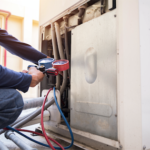
When it comes to cooling your home, it doesn’t occur to most people that elevation plays a role. With scorching summer temperatures on the horizon, it’s important to consider all possible avenues for cooling your home and keeping comfortable. Here’s a look at how elevation can make a difference in your approach.
The Science of Air Flow
One thing that many people don’t realize is that hot air rises. This is why upper floors of buildings are often warmer than lower floors. The same principle applies to homes. If your home is located on a higher piece of land, the hot air will rise to the top of your home, making it more difficult to keep cool. This is why basements are often cooler than upper floors. Once you have this figured out, you can use it to your advantage.
Elevation and Humidity
Another factor to consider is humidity. Hot air can hold more moisture than cold air, so the higher your elevation, the drier the air is likely to be. This can actually work in your favor when trying to keep cool. Dry air feels cooler than humid air, so if you live in a dry climate, you may find that your home is easier to keep cool than if you lived in a more humid climate. Air conditioning systems are designed to pull moisture out of the air, helping you stay both cool and dry.
Your Best Friend the Air Conditioner
As our climate changes, warmer weather conditions have created a demand for air conditioning in areas that previously needed these systems rarely. Knowing how to optimize your ac system will help keep your home at a comfortable temperature while maximizing efficiency. For instance, if you live in a two-story home, the upper floor is going to be harder to cool. In this case, you may want to invest in a zoned cooling system so that you can direct more cool air to the upper floors. This can be a more expensive option, but it may be worth it if you live in a particularly warm climate. Local HVAC companies, like Heroes Heating and Cooling, have the expertise to help homeowners optimize cooling systems so that no matter how hot it gets outside, you can stay cool and comfortable inside.
Ventilation Strategies
In addition to using your air conditioner, there are other ventilation strategies you can use to keep your home cool. One is to install ceiling fans. Ceiling fans circulate the air in a room, helping to evenly distribute the temperature. This can make a room feel cooler without actually lowering the temperature. If you have a basement, opening the windows can help draw cooler air into the home. Using a whole-house fan can also be effective. Whole-house fans are designed to draw cool air in and push hot air out. These fans are most effective when used in conjunction with open windows.
Now that you understand elevation’s role in cooling your home, you can take steps to combat the heat and ensure that your home is as comfortable as possible this summer.
- 5 Ways To Make Your Home More Accessible - April 4, 2024
- Don’t Let Winter Catch You off Guard! How To Prepare for a Furnace Installation - January 1, 2024
- The Benefits of Choosing Organic Foods for Your Family - October 12, 2023






